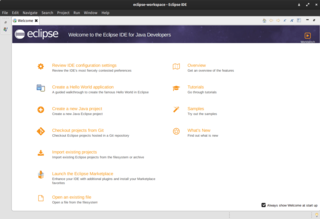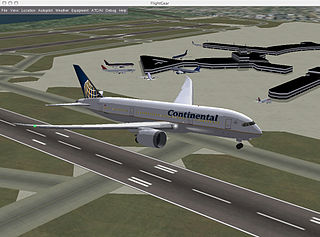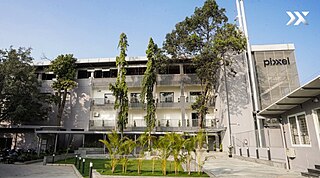
Systems engineering is an interdisciplinary field of engineering and engineering management that focuses on how to design, integrate, and manage complex systems over their life cycles. At its core, systems engineering utilizes systems thinking principles to organize this body of knowledge. The individual outcome of such efforts, an engineered system, can be defined as a combination of components that work in synergy to collectively perform a useful function.

Virtual reality (VR) is a simulated experience that employs 3D near-eye displays and pose tracking to give the user an immersive feel of a virtual world. Applications of virtual reality include entertainment, education and business. VR is one of the key technologies in the reality-virtuality continuum. As such, it is different from other digital visualization solutions, such as augmented virtuality and augmented reality.

The Ames Research Center (ARC), also known as NASA Ames, is a major NASA research center at Moffett Federal Airfield in California's Silicon Valley. It was founded in 1939 as the second National Advisory Committee for Aeronautics (NACA) laboratory. That agency was dissolved and its assets and personnel transferred to the newly created National Aeronautics and Space Administration (NASA) on October 1, 1958. NASA Ames is named in honor of Joseph Sweetman Ames, a physicist and one of the founding members of NACA. At last estimate NASA Ames had over US$3 billion in capital equipment, 2,300 research personnel and a US$860 million annual budget.

FlightGear Flight Simulator is a free, open source multi-platform flight simulator developed by the FlightGear project since 1997.

Eclipse is an integrated development environment (IDE) used in computer programming. It contains a base workspace and an extensible plug-in system for customizing the environment. It is the second-most-popular IDE for Java development, and, until 2016, was the most popular. Eclipse is written mostly in Java and its primary use is for developing Java applications, but it may also be used to develop applications in other programming languages via plug-ins, including Ada, ABAP, C, C++, C#, Clojure, COBOL, D, Erlang, Fortran, Groovy, Haskell, HLASM, JavaScript, Julia, Lasso, Lua, NATURAL, Perl, PHP, PL/I, Prolog, Python, R, Rexx, Ruby, Rust, Scala, and Scheme. It can also be used to develop documents with LaTeX and packages for the software Mathematica. Development environments include the Eclipse Java development tools (JDT) for Java and Scala, Eclipse CDT for C/C++, and Eclipse PDT for PHP, among others.

Laerdal is a multinational company that develops products and programs for healthcare providers, voluntary organizations, educational institutions, hospitals, and the military worldwide. Laerdal has over 2,000 employees in 26 countries. The headquarters is located in Stavanger, Norway.

OrCAD Systems Corporation was a software company that made OrCAD, a proprietary software tool suite used primarily for electronic design automation (EDA). The software is used mainly by electronic design engineers and electronic technicians to create electronic schematics, and perform mixed-signal simulation and electronic prints for manufacturing printed circuit boards (PCBs). OrCAD was taken over by Cadence Design Systems in 1999 and was integrated with Cadence Allegro in 2005.

Delta3d is an open source software gaming/simulation engine API. Delta3d is managed and supported by Caper Holdings LLC. Previously the Modeling, Virtual Environments, and Simulation (MOVES) Institute at the Naval Postgraduate School in Monterey, California managed and supported delta3d. Alion Science has also been a major contributor to enhancements and features.
Business simulation or corporate simulation is business simulations used for training, education or analysis. It can be scenario-based or numeric-based.
Virtual Heroes, Inc. is a developer of serious games in Raleigh, North Carolina, United States. It was founded in 2004.

AdacelTechnologies Limited is a global technology company that develops and implements air traffic management systems, air traffic control simulation and training. The company was established in 1987. Its major customers include Federal Aviation Administration, United States Air Force, United States Department of Defense, and civil air navigation service providers.

A flight simulation video game refers to the simulation of various aspects of flight or the flight environment for purposes other than flight training or aircraft development. A significant community of simulation enthusiasts is supported by several commercial software packages, as well as commercial and homebuilt hardware. Open-source software that is used by the aerospace industry like FlightGear, whose flight dynamics engine (JSBSim) is used in a 2015 NASA benchmark to judge new simulation code to space industry standards, is also available for private use. A popular type of flight simulators video games are combat flight simulators, which simulate combat air operations from the pilot and crew's point of view. Combat flight simulation titles are more numerous than civilian flight simulators due to variety of subject matter available and market demand.
FlexSim is a discrete-event simulation software package developed by FlexSim Software Products, Inc. The FlexSim product family currently includes the general purpose FlexSim product and healthcare systems modeling environment.
Virtual intelligence (VI) is the term given to artificial intelligence that exists within a virtual world. Many virtual worlds have options for persistent avatars that provide information, training, role-playing, and social interactions.

SimGrid is a framework for developing simulators of distributed applications targeting distributed platforms, which can in turn be used to prototype, evaluate and compare relevant platform configurations, system designs, and algorithmic approaches. It provides ready to use models and APIs to simulate popular distributed computing platforms

SonoSim, Inc. is a medical education software development company that develops and distributes an ultrasound education and training product. The company was founded in 2010 by physicians and medical educators to address the growing need for ultrasound training in healthcare.

VisualSim Architect is an electronic system-level software for modeling and simulation of electronic systems, embedded software, and semiconductors. VisualSim Architect is a commercial version of the Ptolemy II research project at the University of California Berkeley. The product was first released in 2003. VisualSim is a graphical tool that can be used for performance trade-off analyses using such metrics as bandwidth utilization, application response time, and buffer requirements. It can be used for architectural analysis of algorithms, components, software instructions, and hardware/software partitioning.

Pixxel (pik·sl) is an Indian private space technology company building a constellation of the world's highest-resolution hyperspectral imaging satellites into a sun-synchronous orbit along with Aurora, its in-house Earth observation platform designed to convert satellite imagery into actionable insights.













